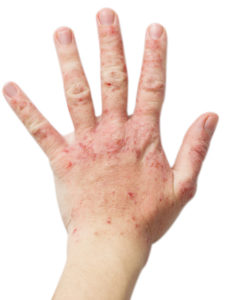How to treat eczema and why do you even have it in the first place?
Dr. Jeremy Fenton of Schweiger Dermatology Group in Midtown Manhattan and Long Beach, NY answers all your burning—and itching—questions about eczema.
Is it dry skin or eczema? This is a common question our dermatology providers get on a regular basis—especially in the winter, when cold weather conditions cause our skin to become red, dry and inflamed. The same attributes that accompany dry skin can be similar to those of an eczema flare. In addition, dry skin itself is a primary trigger for eczema flares. Another questions we often get is, “Is it eczema or psoriasis?” Dr. Fenton tackles all your eczema questions here:
How Eczema Works?

The Eczema Itch
Eczema is considered one of the “peskier” skin conditions, thanks to the constant itch that comes along with it. Research has shown that chronic itch can be debilitating and significantly decrease one’s quality of life, similar to those who suffer from chronic pain.

What Makes Eczema Worse?
The most common reason you get an eczema flare is due to dry skin. One of the primary root causes of eczema is a deficient barrier function of the skin. The moisture and lipids in your skin are a major component of that barrier. Those with eczema need to be extremely diligent about regular moisturizing. Dry weather such as in the winter with the heat on, can dry out the skin. I recommend anybody with eczema to have a humidifier in the winter. Excess bathing and using harsh soaps can also make eczema worse by drying out the skin.
Why Eczema Flares Up?
When the barrier is deficient, things that irritate the skin or things that you are allergic to (and those with eczema have a much higher rate of allergies) can penetrate more easily and deeper. When somebody with eczema comes into contact with these allergens or irritants, it causes the immune system to react and “flare.” This inflammation is another major component of eczema. Those with eczema tend to have a hyper-responsive immune system, leading to inflammation which creates the redness, swelling, and itching of eczema. Everybody will have different irritants or allergens that are triggers, but there are some things in general all eczema sufferers should avoid. These include fragrances (those in soaps, lotions, detergents, perfumes, colognes, air fresheners, and other cosmetic products) and harsh soaps.
How long does eczema last?
Eczema has the highest rate of occurrence in childhood, with many people seeing significant improvement or even resolution in adulthood. However, eczema can be a lifelong condition, and in some it may not even become an issue until later in life (when our skin naturally starts producing less natural moisture).
Will eczema go away without treatment?
It’s hard to know exactly when or if eczema will go away on its own, but follow these rules and hopefully your flare will disappear sooner rather than later:
- Stick to gentle soaps and bland moisturizers – Gentle soaps from brands such as Cetaphil, Cerave, Aveeno, Eucerin, or Dove that are specifically designed for dry or sensitive skin will strip less moisture from the skin, thus maintaining that barrier. Moisturizing with a thick moisturizing cream is important. Creams are better than lotions, as they are thicker. Bland moisturizers avoid fragrances and too many chemicals. Good brands to look for again are those mentioned above.
- Reduce stress / anxiety – Stress and anxiety can make eczema flare. This may be because of the way it affects the immune system and can increase inflammation. Meditation and exercise can be helpful here.
- Avoid alcohol and tobacco – Anything that contributes to a less healthy lifestyle can increase inflammation.
- Avoid fragrances – Fragrances not only are common allergens, but for most with eczema they are also irritants. Thus, always check your products and choose those that are fragrance free.
- Moisturize, moisturize, moisturize – Moisturize after every time you shower/bathe. Put the moisturizer on the skin while it is still damp, try to moisturize within three minutes of getting out of the shower. This will seal the moisture into the skin. Ideally, moisturize more than once per day, increasing it in the winter months.
- Don’t over-wash – Excessive bathing with hot water strips the skin of moisture and can make eczema worse. Take short, lukewarm showers no more than once per day and moisturize immediately after. Wash your hair, face, underarms, groin and feet. Don’t soap up other areas unless visibly dirty, as these don’t generate as much oil and are unlikely to create odor. There is no need to scrub away the oils on your lower legs!
- Use a humidifier during the winter – This is based on the idea that anything that helps to maintain moisture in the skin will help keep eczema under control.
- Keep stress levels down – Stress leads to more inflammation in the body, including the skin. Since inflammation is an important part of eczema, anything that reduces it will generally be helpful.
- Follow a healthy eczema diet – There are no definitive studies that indicate what type of diet has an impact on eczema. However, there are some foods and diets that are considered likely to promote more of an inflammatory environment in the body such as simple, processed carbohydrates such as sugars, white breads, and other processed foods. We recommend that eczema patients interested in changes to diet to stick with a typical healthy and balanced diet with whole foods such as fruits, vegetables and whole grains.

We have over 100 offices in NY, NJ, PA, CT, FL, IL, MN and MO. For appointments, call Schweiger Dermatology Group at (844) DERM-DOC.
To find a location near you, check out our location pages. We look forward to working together to find the best treatment for your skin.

